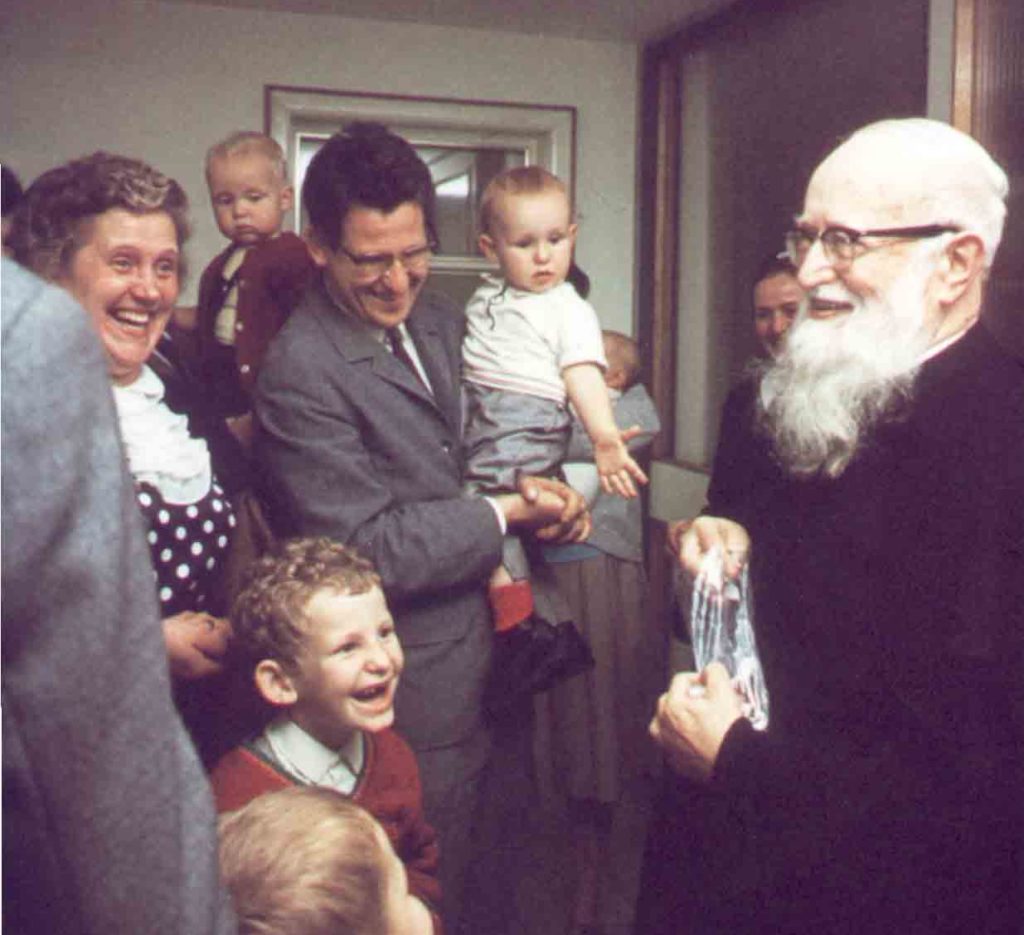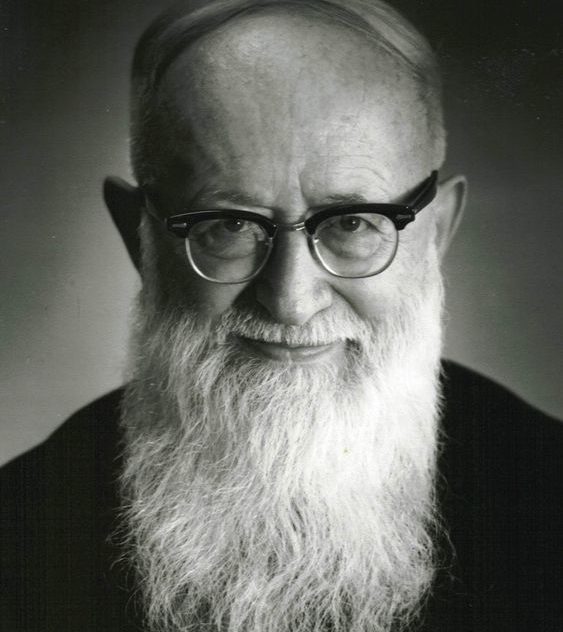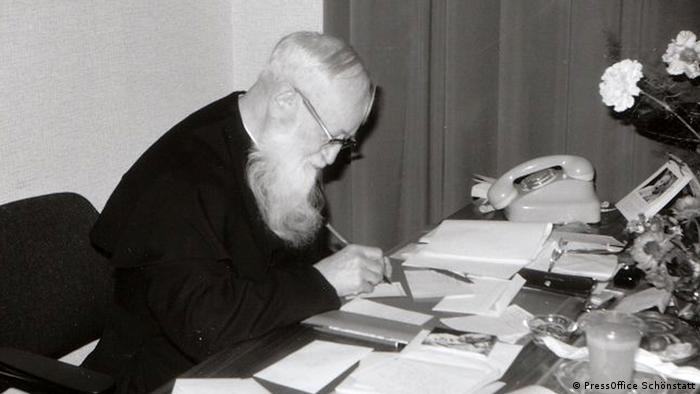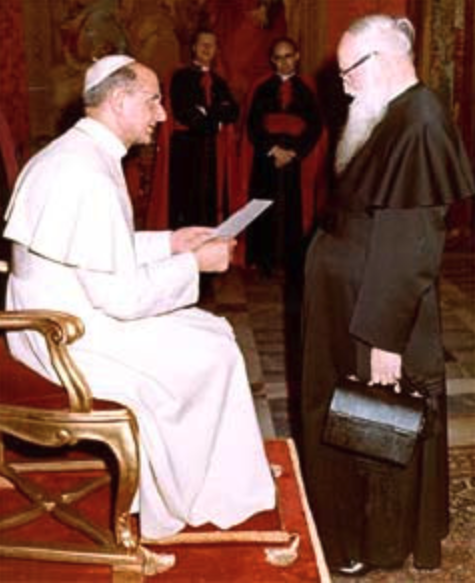Through this website we share texts that refer to Fr. Joseph Kentenich, founder of the Schoenstatt Movement.

We know Fr. Kentenich as a prophetic figure,
as an educator who knew how to awaken with surprising mastery the vital impulses of his students, listening to the whispers of God in their souls, motivating them to a full development of their virtues, in profound inner freedom.
We know him as a personality who lived and transmitted a deep relationship with God, through Mary, whom he sought to resemble in his purity, filiality and dedication.
We know him as a figure of the 20th century who broke away from patterns, loosened ties that suffocated the Catholic person in obsessive categories of obligation and sin, so that they could develop a filial relationship with the God of love, with God as Father, with Christ as Redeemer and with the life-giving Holy Spirit, through Mary, as mother and educator.

We know him as the prophet who has his hand on the pulse of time and his ear on the heart of God.

Difficult challenges
The Church of the 20th century was not prepared to understand this, and put his foundation and himself to the test. A test that was for Fr. Kentenich harder than confinement in the hermetic bunker and the concentration camp, because it was that Church, for which he gave soul and life, that did not understand him and that had sent him into a 14-year exile in the United States, not as a punitive measure, but to analyze Schoenstatt without the influence of its founder.
Liberation
In those 14 years, Fr. Kentenich had an unshakable confidence that Mary would free him from exile and open the way for his return to Schoenstatt. And so it happened. During the time of the exile he was the victim of slander and insults. But the Holy Office, an institution of the Church that used to judge people and penalize them harshly without giving them the right to defense, - which is who sent Fr. Kentenich into exile - never issued a decree accusing him of any crime. After profound investigations, and proving his innocence, he was rehabilitated in 1965 by Pope Paul VI to fully comply with his duties as founder of the Schoenstatt Movement.

Publicity of accusations
In the year 2020 the Vatican archives were made public, which go back to 1958, the year in which Pope Pius XII died. This brought to light documents of accusations against Fr. Kentenich that had already been reviewed by various Vatican congregations before Fr. Kentenich was released from exile, and also before his cause of canonization was opened. Eventually, some more documents appear, which are exactly in the same line.
The historian A. von Teuffenbach is a researcher of the works of Fr. Sebastian Tromp, who would represent the Holy Office as Apostolic Visitor in Schoenstatt. This historian has published several times accusatory documents against Fr. Kentenich, most of which had been evaluated, as mentioned before, by different congregations of the Vatican Curia, but what is striking is that she does it in the same way that the Holy Office acted: accusing without comparing the information with other sources, without taking into account the time in which the events took place, the validity of the reporters, the possible conflicts for which they issued such judgments, and without mentioning the statements of Fr. Kentenich himself, nor of thousands of people - including 1,700 Sisters of Mary - who testify to the contrary of what the aforementioned historian intends to prove through the accusations of a few people.
EDITORIAL LINE
1.
This website is independent and is managed by members of the Schoenstatt Movement.
2.
JKentenich.org wants to be a part of the search for truth in all that concerns Fr. Kentenich.
3.
We want to contribute by sharing contexts, which includes what we know about Fr. Kentenich throughout his life, as well as the results of the investigations presented by the new Commission of Historians for the beatification of Fr. Joseph Kentenich, established in the Diocese of Trier, as well as the international Investigation Group, constituted by the General Presidency of Schoenstatt.
4.
It is clear to us that a lie is a truth told in a false context or a falsehood told in a true context.
See homily of Bishop Jorge González
5.
Feeling that we are part of a Schoenstatt family, we do so in the same spirit that our founder taught us through his example of life: in communion with the General Presidency of Schoenstatt, whose members we thank for leading the Movement in these difficult times, and knowing the complexity involved in making decisions. We value their statements. While we would like them to be more continuous and comprehensive in their response to the issues at hand, we understand the difficulty of achieving this with the speed we would like. We support all their efforts to expose the truth, an undeniable value for our founder and for the Schoenstatt Movement.
6.
We do so in the spirit that inspired so many priests, sisters and lay people in the Movement during Fr. Kentenich’s time in exile. Thanks to them, the graces of the Shrine reach millions of people around the world today. We will not wait for everything to become clearer before expressing our confidence in Fr. Kentenich.
See homily Bishop Jorge González: “We are childlike, not immature adults or naive children”.
See article in Spanish “P. José Kentenich: No voy a esperar 20 años”. (Fr. Kentenich, I won’t wait 20 years.)
7.
We give credit to serious investigations, which try to understand and explain the complexity of reality, including the reports of the above mentioned commissions and others that we share.
8.
We don’t doubt for a moment that God allows crises, and even sends them, so that better things can come about. We believe that God uses this upheaval to open up paths that will inspire many to know in depth the charism of Fr. Kentenich for the Church and society, and to confront it in depth with his prophetic spirit. We are confident that all this will accelerate his process of canonization.